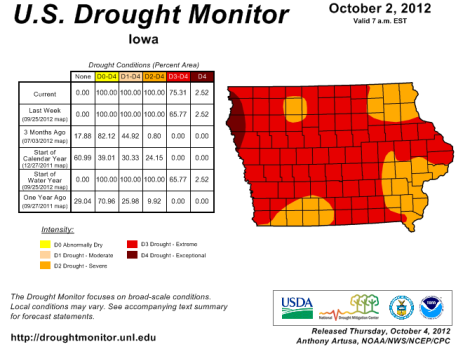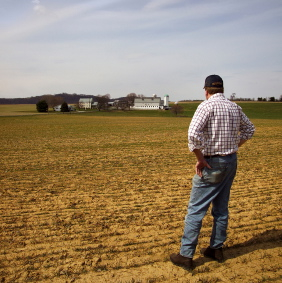It’s Oct. 8. Autumn. Here in New York, it hasn’t gotten above 55 degrees today. Leaves are turning. It’s snowing in Colorado and Minnesota.

DroughtMonitorClick to embiggen.
And the drought persists. In Iowa, it’s as bad as it has been all year. From the Waterloo Courier:
Three-quarters of the state is now experiencing at least D3, or extreme, drought. Portions of five counties in western Iowa remain in D4, or exceptional, drought. No part of Iowa improved.
The degradation from D2, severe, to D3, extreme, affected an additional 10 percent of the state.
The primary ingredient necessary to alleviate the situation — rain — was once again in short supply across the region.
We associate drought with hot, dry summer days. But cooler doesn’t necessarily mean any less dry — and freezing will only make the situation worse.
Frozen ground also prevents rain from absorbing, according to [Mike Gannon, a hydrogeologist with the Iowa Department of Natural Resources].
“Once you have frost, you get no recharge until spring. Any precipitation that falls, because frost is in the ground, it can’t make it into the aquifers,” Gannon said.
The situation is particularly dire for the region’s rivers.
The Wapsipinicon River at Independence this morning was discharging 4.8 cubic feet of water per second, an all-time low for the date, according to the U.S. Geological Survey. The previous low flow was 16 cubic feet per second based on 78 years of records. …
The Cedar River in Charles City was at an all-time low for the date as well. The river was pumping just 118 cubic feet of water per second. The record is 120 cubic feet per second and normal range is 193 to 881. …
[Kip Ladage, coordinator of the Bremer County Emergency Management Agency,] is concerned, heading into winter, what that might mean for aquatic wildlife.
“If we don’t have much water now and it starts to freeze, are we going to see big fish kills? I’m guessing yes,” he said. “There’s no place for the stuff to go.”
The article does note, though, that it rained in Waterloo on Thursday — 1/100th of an inch.



